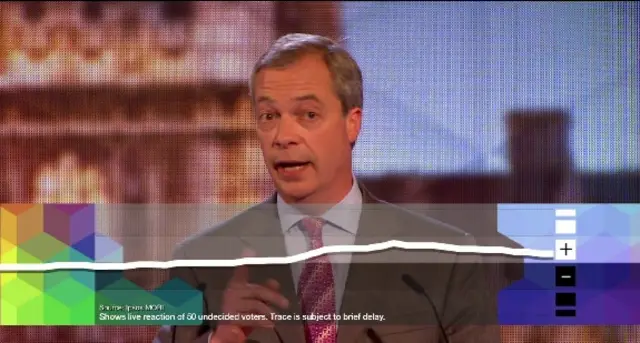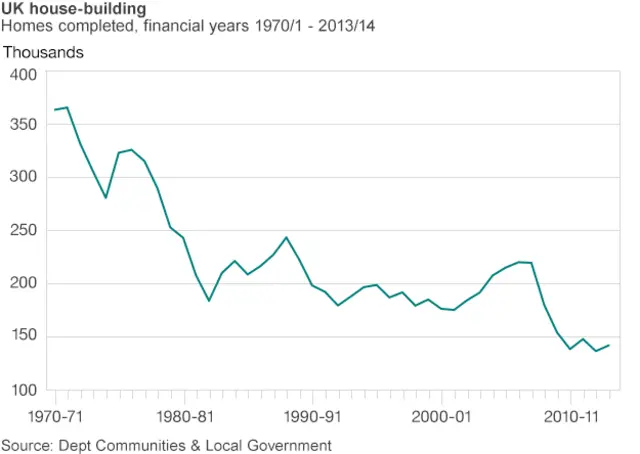Jo Coburn, BBC Daily Politics presenterpublished at 20:46 BST 16 April 2015
@Jo_Coburn
Quote MessageNigel Farage pushing at Tory bruise by saying UKiP committing to 2% of GDP spending in defence #BBCDebate
Five Westminster opposition party leaders took part in a debate, with Labour's Ed Miliband and the SNP's Nicola Sturgeon in heated exchanges
UKIP's Nigel Farage accused the audience - which was independently selected and broadly representative - of being "left-wing"
Leanne Wood, of Plaid Cymru, and the Green Party's Natalie Bennett took on Mr Farage over his attitude to migrants
In other news - Richard Desmond, whose publishing company owns the Daily and Sunday Express, gave £1m to UKIP
Nick Clegg said a vote for the Lib Dems could prevent a right-wing coalition of the Conservatives, UKIP and the DUP - or "Blukip"
There are 21 days left until polling day
Tim Fenton, Andy McFarlane, Bernadette McCague and Tom Moseley
@Jo_Coburn
Quote MessageNigel Farage pushing at Tory bruise by saying UKiP committing to 2% of GDP spending in defence #BBCDebate
Douglas Fraser, BBC Scotland Business and Economy Editor
Asked about housing, Nicola Sturgeon dismisses Tory plan to extend right-to-buy for housing association tenants in England. The right-to-buy is being ended in Scotland. The Scottish government, with housing associations, say the loss of houses to cut-price sales makes it more difficult to fund new housing to replace stock, and doesn’t do anything to tackle homelessness.
@mjdavies1
Quote MessageRight to Buy is great as long as you have more social housing being built, which isn't happening #BBCDebate
@bbclaurak
Quote MessageNot sure that attacking the audience is a great look... Sturgeon piles in, 'you're worried every problem is caused by immigrants'
@rosschawkins
Quote MessageLabour source: others are asking Miliband questions because he's the alternative PM on stage
 Reality Check
Reality Check
Ed Miliband says that house building is at its lowest level since the 1920s, a claim that came from a report, external from the centre-right think tank Policy Exchange in 2012.
However, this statement was based on the coalition removing Regional Spatial Strategies (RSSs). Introduced by the last Labour government, RSSs gave English regions Whitehall targets for homes to be built.
Policy Exchange’s paper said that, as at 2012, councils were planning to build 272,720 fewer new homes since the abolition of the regional planning system.
As noted in this Guardian article, external, councils now have powers to set housing targets – and have had such powers since 2010.
A government spokesperson told The Guardian that Policy Exchange’s analysis was flawed as it did not allow for the fact that RSS targets "had not worked".
The spokesperson said: "Top-down regional targets didn't work and built nothing but resentment. It is meaningless to point to targets which were never going to be built. It was under regional strategies that house building fell to its lowest peacetime rates since the 1920s."

 Sean Curran
Sean Curran
Parliamentary correspondent
It isn’t quite Hamlet without the prince or even Rosencrantz and Guildenstern are missing, but there’s no doubt it’s a bit unusual to have an election debate without David Cameron and Nick Clegg.
Quote MessageThe leaders of the five opposition parties don’t seem to be mourning the absence of the deputy prime minister but Mr Cameron has certainly had plenty of name checks so far. The biggest round of the applause in the first twenty minutes came when Nicola Sturgeon said it was a disgrace that the PM wasn’t there to defend his record.
This has left the Labour leader, Ed Miliband, in the line of fire, facing criticism from Natalie Bennett, Leanne Wood and Nicola Sturgeon as well an early exchange with Nigel Farage.
 Reality Check
Reality Check
Natalie Bennett says students are leaving university with an average of £44,000 of debt, of which 45p in the pound will never be repaid.
Astudy, externalby the Institute for Fiscal Studies suggested that three quarters of English graduates will not repay their student loan in full. The IFS’s researchers concluded that a typical student would be leaving university with “much higher debts than before”, averaging £44,000.
TheIFS, externalalso said their estimates suggest that for each £1 loaned out to students, the long-run cost to the government would be 43.3p. However, they said that estimate could change depending on what happens to graduate earnings.
@psmith
Quote MessageMy 14-month-old son’s reaction to the debate is to scream his head off then fall asleep which is pretty much the same as my reaction.

 Reality Check
Reality Check
Nigel Farage says our debt repayments are bigger than our annual defence budget.
He's right - the Ministry of Defence said that the defence budget for 2013/14 was £34.3bn. In that year Britain’s debt repayments cost £48.7bn, according to the House of Commons Library.
@toadmeister
Quote MessageI’m impressed that @Nigel_Farage is live tweeting the #BBCDebate while participating in at the same time. Didn’t even see his hands move!
Douglas Fraser, BBC Scotland Business and Economy Editor
SNP plan for UK finances is to increase spending 0.5% per year, taking on a further £180bn in debt over the next Parliament. IFS says Labour could accept the SNP projection if it were willing to take longer to reach a budget surplus.
@benrileysmith
Quote MessageThis debate is clearest evidence yet that SNP, Greens and Plaid will come together and hold Ed's feet to the fire in a hung parliament.
 Reality Check
Reality Check
Nicola Sturgeon says one million more children are living in poverty. The figure’s from an IFS forecast in 2013 for the whole of this decade. Read more detail on child poverty in our Reality Check.
@SunNation
Quote MessageSturgeon missile continues to strike: "Miliband is Tory-lite". Ed looks pained, he's agonising here #BBCDebate
@tombateman
Quote MessageBiggest applause of debate so far for Nicola Sturgeon: "It is a disgrace that David Cameron is not here to defend his record" #debate2015
 Reality Check
Reality Check
Ed Miliband says he would balance the books in the next parliament.
Labour has set out several fiscal targets. One of them is to reduce the deficit (that's the difference between what it spends and what it raises) every year. Labour also plans to bring the current deficit (the deficit excluding investment spending) into surplus as soon as possible during the next parliament. But this measure of the deficit doesn’t include borrowing to spend on long-term infrastructure projects. So Labour’s plan does allow room for some borrowing and the party’s fiscal rules would only “balance the books” for part of the deficit.
@JPonpolitics
Quote MessageMiliband stresses economic responsibility. This MAY appeal to some Lab doubters - it WILL annoy many in Scotland where Lab cornered by SNP.